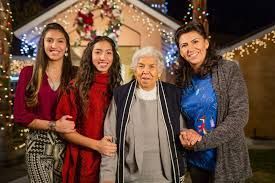Getting Help As A Caregiver
Okay, so you’re a caregiver and feel guilty for wanting some time alone. There is no shame in getting help as a caregiver and saying I need a break!
Why? Because it’s in our nature to think we can do everything on our own without asking for help, but you and I both know, deep down, that’s not true!
Sometimes, we all need help and caregiving is a full-time job in itself. I’m sure you also have to keep the house, do laundry, cook meals and sometimes take care of children. That’s a lot for a person to handle. Asking for help is nothing to feel guilty about and can cause damage to your own health if you don’t.
Here are some recommendations for ways to get outside help for yourself.
Ask Family & Friends for Help
 Ask your family and close friends. Some people don’t realize you need help unless you ask for it. Sit down and have one-on-one conversations with each person and detail what you will require of them. Play on their individual strengths when asking them to do things; such as grocery shopping, running errands, doing home repairs, light housekeeping, etc. Figure out who does what best and use that to your advantage.
Ask your family and close friends. Some people don’t realize you need help unless you ask for it. Sit down and have one-on-one conversations with each person and detail what you will require of them. Play on their individual strengths when asking them to do things; such as grocery shopping, running errands, doing home repairs, light housekeeping, etc. Figure out who does what best and use that to your advantage.
Hire Someone
 Hire someone for the home tasks. Caregiving can be overwhelming and taking care of the everyday household chores can add to your stress. If no family members or friends are available, hire someone to do those things for you. Have someone come in and do the housekeeping, grocery shopping, lawn maintenance, home repairs, and cooking the meals. This will ease up so much of your time and relieve a lot of stress off your shoulders.
Hire someone for the home tasks. Caregiving can be overwhelming and taking care of the everyday household chores can add to your stress. If no family members or friends are available, hire someone to do those things for you. Have someone come in and do the housekeeping, grocery shopping, lawn maintenance, home repairs, and cooking the meals. This will ease up so much of your time and relieve a lot of stress off your shoulders.
Hire a Caregiver
 Hire a caregiver to come into the home. As we age, our needs increase and this means the caregiver must take on much more. Your loved one may require more attention such as bathing, dressing, feeding, etc., but you already have your hands full so don’t take on more than you can handle. Hire a caregiver to come in a few hours a day or week to give yourself a much-needed break.
Hire a caregiver to come into the home. As we age, our needs increase and this means the caregiver must take on much more. Your loved one may require more attention such as bathing, dressing, feeding, etc., but you already have your hands full so don’t take on more than you can handle. Hire a caregiver to come in a few hours a day or week to give yourself a much-needed break.
Adult Day-Care
 Enroll your loved one in an adult daycare program. These programs are places where your loved one can go and receive socialization, care, and nutritious meals for the day. They are generally offered through the local Council on Aging and in some of the assisted living communities. Adult daycare programs can also be less costly than hiring a home caregiver.
Enroll your loved one in an adult daycare program. These programs are places where your loved one can go and receive socialization, care, and nutritious meals for the day. They are generally offered through the local Council on Aging and in some of the assisted living communities. Adult daycare programs can also be less costly than hiring a home caregiver.
Respite Care
 Find local respite care. What is respite care
? Respite care is when your loved one goes to an assisted living community for a minimum of two weeks and they receive all the amenities as if they lived there permanently. This is also a great way to introduce assisted living to your loved one. Who knows, they may love it and not want to leave.
Find local respite care. What is respite care
? Respite care is when your loved one goes to an assisted living community for a minimum of two weeks and they receive all the amenities as if they lived there permanently. This is also a great way to introduce assisted living to your loved one. Who knows, they may love it and not want to leave.
Support Groups
 Join a support group! This is so important for your mental health. This gives you the opportunity to meet others experiencing the same feelings and issues you are. Assisted Living Made Simple
holds five support groups a month throughout Volusia County. Please find one that fits your schedule.
Join a support group! This is so important for your mental health. This gives you the opportunity to meet others experiencing the same feelings and issues you are. Assisted Living Made Simple
holds five support groups a month throughout Volusia County. Please find one that fits your schedule.
You are NOT alone on this journey.
As you can see, there are many ways to find help if you are a caregiver. We at Assisted Living Made Simple know how hard it is to juggle life alone and throwing caregiving on top of it can be a real struggle.
PLEASE reach out for help! Our services are always FREE!!!



